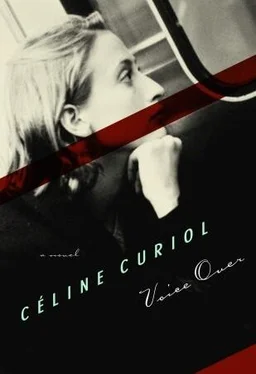Celine Curiol - Voice Over
Здесь есть возможность читать онлайн «Celine Curiol - Voice Over» весь текст электронной книги совершенно бесплатно (целиком полную версию без сокращений). В некоторых случаях можно слушать аудио, скачать через торрент в формате fb2 и присутствует краткое содержание. Год выпуска: 2008, Издательство: Seven Stories Press, Жанр: Современная проза, на английском языке. Описание произведения, (предисловие) а так же отзывы посетителей доступны на портале библиотеки ЛибКат.
- Название:Voice Over
- Автор:
- Издательство:Seven Stories Press
- Жанр:
- Год:2008
- ISBN:нет данных
- Рейтинг книги:5 / 5. Голосов: 1
-
Избранное:Добавить в избранное
- Отзывы:
-
Ваша оценка:
- 100
- 1
- 2
- 3
- 4
- 5
Voice Over: краткое содержание, описание и аннотация
Предлагаем к чтению аннотацию, описание, краткое содержание или предисловие (зависит от того, что написал сам автор книги «Voice Over»). Если вы не нашли необходимую информацию о книге — напишите в комментариях, мы постараемся отыскать её.
Voice Over — читать онлайн бесплатно полную книгу (весь текст) целиком
Ниже представлен текст книги, разбитый по страницам. Система сохранения места последней прочитанной страницы, позволяет с удобством читать онлайн бесплатно книгу «Voice Over», без необходимости каждый раз заново искать на чём Вы остановились. Поставьте закладку, и сможете в любой момент перейти на страницу, на которой закончили чтение.
Интервал:
Закладка:
The platform seems rather empty. Maybe the group that overtook her in the corridor just now, which seemed to consist of many people at the time, have found unlikely hiding places along the narrow concrete strip which is only long enough for four minimalist benches. Or else they have gone on their way, as a dense frantic mob through secret passageways of the Parisian transport network. Her footsteps ring out under the tiled vault. Up ahead of her, a small crowd has gathered and is silently staring down at something on the ground. She moves closer. At first she thinks she’s looking at a large, bulging canvas sack. But the sack has shoes and hands pressed together under a creased, grimy face. For a moment, she does what the others are doing: she observes the man lying hunched on the ground. There is a barely dried bloodstain on his temple. She shoots an alarmed glance at the people around her, but for all their signs of agitation, they remain engrossed in their detailed scrutiny of the man. They seem fascinated, mesmerised by the spectacle of the totally lifeless body, which, deep down, they find repellent. The man’s immobility strikes her as more and more suspect. She reaches out a cautious hand in the direction of his shoulder. The travellers take several steps back, their eyes swivel by several degrees. The voice of one onlooker comes straight at her. Do you know him? Asked as if it were a warning, the question almost causes her to have doubts. Quick, mustn’t get distracted by the reproachful tone. (The film would be a Franco-American co-production. It would be the scene in which everything takes a sudden turn for the worse: the young heroine is discovered next to the body, which she has touched — it can’t be said enough, when you find a dead body, keep your mitts off. A passer-by raises the alarm, the police find out that she and the dead man had been lovers; to cut a long story short, the guilty party — there is always a guilty party — is her.) What difference does that make? She can’t see what difference that makes. And says so to the young nosey-parker, who proceeds to chew his lip, either because for him it does make a difference, obviously it does, someone you know and a complete stranger can hardly be the same thing, how can you say otherwise, or else because it doesn’t make any difference and it is he, who arrived on the scene before her, who should have reached out to touch the man’s shoulder, just as she is doing now. She brings her fingers down on the almost adhesive surface of the coat. Tentatively, as if the mocking head of a clown might suddenly rear up at her, frightening in its gargantuan laughter. She presses through the layers of clothing to touch him, a piece of skin, muscle, bone, so that he, in turn, can feel someone there by his side. After maintaining the pressure for a few seconds, she draws back her hand. The body is not moving. As if she has just performed an act of exemplary courage, the crowd around her begin talking again. (New script: the American side of the co-production is now in charge; no way can they leave the ending as it is. The heroine finds the body just in time for the emergency services to get to the scene and for the man — who through a series of clever flashbacks, we discover was her lover — to escape death.) Someone asks if he’s moving, someone asks what’s the matter with him, someone asks. . A shiver passes in a wave up through her scalp. Pursing her lips and ignoring the questioning stares, she manages to get to her feet and pushes through the circle of onlookers. She strides back off the way she came. She meets no resistance; the corridors are empty. Passing by the poster, she is tempted to check if her name is still printed on its glossy surface. She goes all the way back up to the ticket windows, where there is no line. Inside two men in khaki-green outfits bearing the RATP logo are in plenary session. The window is transparent, as transparent as a clean window should be, but the men appear not to see her behind it. Bringing her mouth closer, she says in a loud voice that there is a man down there who is not well; they ought to send someone along. Her words smash into the glass partition, dribbling down it in long, invisible streaks. Inside the ticket office, the two human puppets continue to hold forth, voluble specimens of a species soon to be extinct. She is not in the métro but in a museum, where, as everyone knows, it would be ridiculous to talk to any of the stuffed creatures in the display cases. She gives three short raps; the two heads swivel. One head, wearing the expression of a cashier on a bad day, leans down to the opening at the base of the window. There’s a man on the platform in terrible shape; can someone go and help him? Between the time it takes for her to see that he has understood and for him to start talking, she’s gone. The RATP employee knows, he’ll do what’s necessary, she’s told him, he doesn’t need her now. And so she flees, because she finds it all very upsetting — not the man slowly expiring in his dirt and misery, but the living ones insensitive to the urgency of death.
She walks aimlessly along, leaving the market behind her. She could cry if she wasn’t worried that sobbing would slow her down. Something is happening back there; she ought to have stayed on as a witness. She walks along, no longer seeing the pavement, the buildings, the cars, the passers-by, the mopeds. No matter the city, no matter the age, there are transitional moments when a person exists by default, by pure reflex. It ought then to be possible to fall asleep on the spot, to let that moment of floating pass, and to launch oneself into orbit around everyday life. The street runs into a small, three-sided public garden. She pushes through the metal gate. There are three marble benches. A fishbowl filled with water has been placed on the end of each one, a goldfish swims inside. No one around. The gravel crunches underfoot. The fish revolve at varying speeds, at times bouncing off a translucent obstacle and, in a fit of pique, shooting back the other way. From above, they seem very slender; from the side, bloated, almost obese. She looks around for who could have set the three fishbowls down in this unusual spot, but she seems to be the only person there. Tugging up her sleeve, she plunges her fingers into the large bubble of water. The fish wriggles away, working its fins to avoid the hand that has just burst in on its world. She feels like catching the delicate slippery body, hauling it out of the water and contemplating the mouth opening and closing in the suffocating air. Once, at the seaside, she’d observed a fish that had been thrown down on the shingle after being caught. A terrible, fascinating sight. Blood was trickling from its gills; now and then its body would wriggle. She’d crouched down and with her finger had given the animal’s scales a timid caress. She had asked if it couldn’t be put back in the water. The fisherman had laughed at her. It’s just a fish, they’re made to be eaten.
Someone is calling out to her. Just what does she think she’s doing? She pulls her fingers out of the fishbowl at once. A woman, who must have been lying in wait behind a bush, is striding towards her. Addressing her as though she were a prize idiot. It’s an in-sta-lla-tion, not a finger-bowl, looking is fine, but no touching, do you understand? Her hair in dreads, an orange band around her forehead, a ring in her nose, the woman is about to knock her down. Given a sword, she’d have pulled it out already in order to slice her into little pieces. Your installation is really great. The anger drops from the woman’s face. Artists live at the mercy of compliments, which is why she doesn’t understand them very well. Don’t worry, I’m going now. Actually, the artist would be happy for her to stay and share a few more favorable impressions of her work, maybe even ask her questions about where she gets her inspiration. She’d be happy now to give her permission to dip her fingers in, let her art become interactive. Accessible to ordinary folk like her, isn’t that the criterion all creators must live by? She has heard what the artist is saying but has no real opinion on the matter.
Читать дальшеИнтервал:
Закладка:
Похожие книги на «Voice Over»
Представляем Вашему вниманию похожие книги на «Voice Over» списком для выбора. Мы отобрали схожую по названию и смыслу литературу в надежде предоставить читателям больше вариантов отыскать новые, интересные, ещё непрочитанные произведения.
Обсуждение, отзывы о книге «Voice Over» и просто собственные мнения читателей. Оставьте ваши комментарии, напишите, что Вы думаете о произведении, его смысле или главных героях. Укажите что конкретно понравилось, а что нет, и почему Вы так считаете.












